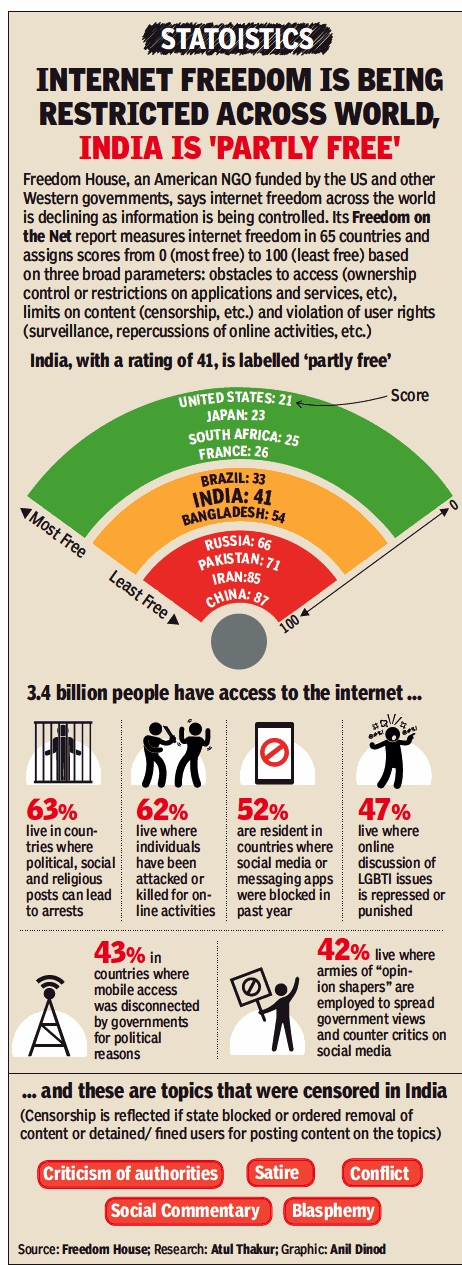Internet: South Asia
This is a collection of articles archived for the excellence of their content. |
Contents |
Internet freedom: South Asia
2014
Internet freedom improves in India
Kim Arora The Times of India Dec 05 2014
Now Ranks 30 Among 65 Countries: Study
India made a positive jump of five spots to be ranked 30 among 65 countries in a study on internet freedom by the US-based watchdog organization Freedom House.Titled “Freedom on The Net“, the report assesses internet freedom in various countries against the metrics of accessibility, limits to content, and user rights violations.
India figures in the “partly free“ category along with Rwanda, Tunisia, Singapore, and Sri Lanka. With a cumulative score of 42, India showed an improvement over last year's score of 47 (higher score indicates lower freedom). Iceland, Estonia, and Canada are the top three countries in the list. Pakistan ranks 56 while China is at number 63. Last year, India's rank on the same list was 35.
“The regulatory framework that governs the internet in India is at a pivotal moment,“ says the report, adding, “Detentions declined in the past year in the wake of negative publicity , as well as intervention from the government and Supreme Court.Several petitioners have chal lenged parts of the IT Act...as unconstitutional in the SC.The court's decision in these cases will be critical to the protection of freedom of expression online in India.“
The report also takes note of the lack of a privacy law and the government's Central Monitoring System for the surveillance of communication over the telephone and the internet. Lack of infrastructure and low digital literacy added to the “obstacles“ tally, though the study takes note of the fact that India became the third largest internet consumer base in 2013.
“There was a spate of incidents where free speech was hindered online. But now, I think more than the government, the people have become more aware and responsible about these things,“ says activist Aseem Trivedi, who was briefly jailed in 2012 for his anti-establishment cartoons.“There is room for improvement when it comes to those who manage to foment sectarian violence online,“ he says.
Bhopal-based Shubhranshu Choudhary , who is behind the digital citizen journalist program CGNet Swara, says that in terms of access, improvement is only marginal.“In the normal course of things, it is more or less the same. Yes, there are more mobile towers now, and we have bulky figures for mobile penetration. The government also seems to be talking more about digital expansion. But with Internet penetration at about 15% India remains behind,“ says Choudhary .
2016
Nov 15 2016 : The Times of India
Internet freedom around the world declined in 2016 for the sixth consecutive year with governments in 24 countries impeding access to social media, says a report from the US-based think tank organization Freedom House.Its annual report -Freedom on the Net -measures the level of online freedom on an index that takes into account acts of censorship, modes of access, and violations of fundamental rights.
This year's report finds that India's score on the online freedom index fell [i.e. improved] by a point to 41. This is on a scale of 0100, where 0 is the best and 100 the worst. Pakistan recorded a score of 69. China, identified as the “the year's worst abuser of internet freedom“ scored 88. The US recorded a healthy score of 18. While there was an overall global decline, 14 countries registered a “modest“ improvement, says the report.These include US, Sri Lanka, Zambia, and South Africa.
Excerpts related to South Asia
The steepest declines were in Uganda, Bangladesh, Cambodia, Ecuador, and Libya.
In Bangladesh, the authorities ordered the blocking of platforms including Facebook Messenger, WhatsApp, and Viber to prevent potential protests following a Supreme Court ruling in November that upheld death sentences for two political leaders convicted of war crimes. The longest block lasted 22 days.
In Bangladesh, Islamist extremists claimed responsibility for the murders of a blogger and the founder of an LGBTI magazine with a community of online supporters.
In Sri Lanka, taxi apps like PickMe introduced an SOS button that allowed customers trapped in flood-affected areas to mark their location for rescue.
Digital activism also flourished in Sri Lanka as censorship and rights violations continued to decline under President Maithripala Sirisena’s administration.
At least three criminal charges were filed in India against the administrators of WhatsApp groups based on offensive or antireligious comments shared by other group members.
In 2016, internet service providers in India were ordered to block jihadology.net, an academic repository of primary sources about Islamist militancy. I
India’s telecommunications regulator banned differential pricing schemes in February after more than a million comments were submitted online to protest companies that charge consumers different prices for select content or applications.
Penalties are even harsher in Pakistan, where antiterrorism courts sentenced two men in separate cases to 13 years in prison for promoting sectarian hatred on Facebook. A lawyer for one of the men said he had only “liked” the post in question, which was described as “against the belief of Sunni Muslims.”
Scores in 2016
(O is best, 100 is worst)
India 41 (improved from 42 in 2014, which was better than 47 in 2013)
Sri Lanka 44
Bangladesh 56
Myanmar 61
Pakistan 69
China 88
2017

From December 4, 2017: The Times of India
See graphic:
Internet freedom, 2017, Bangladesh, India, Pakistan and the world